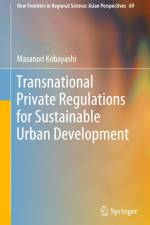av Masanori Kobayashi
1 405
This book analyzes the mechanism of transnational private regulations (TPRs) in the global property investment market and the conditions of their effectiveness for sustainable urban development. In the present economy, with control over national legislation alone, state policymakers have been challenged to regulate transnational investors, markets, and issues such as global warming, financial crises, food safety risks, deforestation, and cross-border business transactions. Transgovernmental networks of regulators have assembled representatives and technical experts from national regulatory agencies, nongovernmental organizations, private firms, and business organizations. As private corporations become increasingly globalized, many forms of TPRs have emerged since the 1990s for legislation, standard-setting, monitoring of compliance, and implementation of transnational rules, to respond to challenges posed by the transformation of domestic and international regulatory environments. TPRs are self-regulated, non-state, market-driven regulations. Since the emergence of TPRs, the global rule-making landscape has become dynamic. Urban development and property investment have been viewed historically as local phenomena: The regulations and standards in this field have been established and enforced by governments, local associations, and national professional bodies. However, as urban development and property investment increasingly have been globalized, the services, transactions, and investments by private firms have transcended national boundaries. For this reason, it has become difficult for states to regulate global activities through existing national legislation or international regulatory systems. As the management of new transnational issues through collaborations between various actors is unpredictable, it is necessary to examine the mechanism of TPRs in global property investment and their effectiveness for sustainable urban development.

